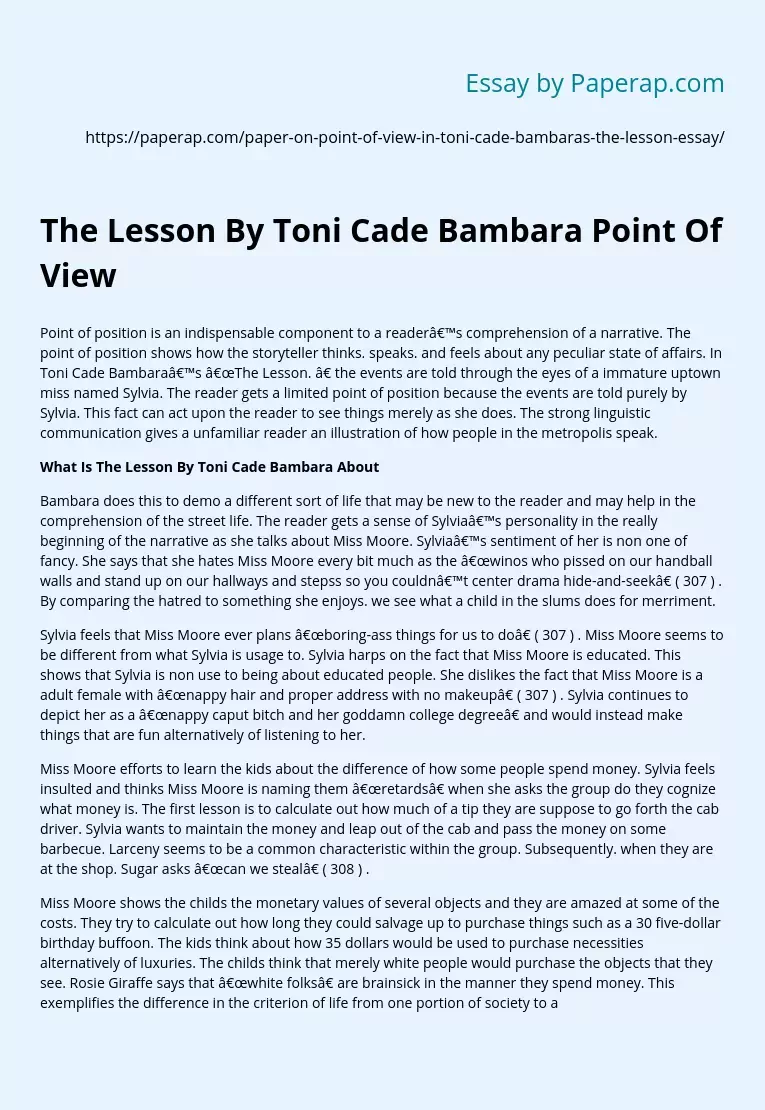The Lesson By Toni Cade Bambara Point Of View
Point of position is an indispensable component to a reader’s comprehension of a narrative. The point of position shows how the storyteller thinks. speaks. and feels about any peculiar state of affairs. In Toni Cade Bambara’s “The Lesson. ” the events are told through the eyes of a immature uptown miss named Sylvia. The reader gets a limited point of position because the events are told purely by Sylvia. This fact can act upon the reader to see things merely as she does.
The strong linguistic communication gives a unfamiliar reader an illustration of how people in the metropolis speak.
What Is The Lesson By Toni Cade Bambara About
Bambara does this to demo a different sort of life that may be new to the reader and may help in the comprehension of the street life. The reader gets a sense of Sylvia’s personality in the really beginning of the narrative as she talks about Miss Moore. Sylvia’s sentiment of her is non one of fancy.
She says that she hates Miss Moore every bit much as the “winos who pissed on our handball walls and stand up on our hallways and stepss so you couldn’t center drama hide-and-seek” ( 307 ) . By comparing the hatred to something she enjoys. we see what a child in the slums does for merriment.
Sylvia feels that Miss Moore ever plans “boring-ass things for us to do” ( 307 ) . Miss Moore seems to be different from what Sylvia is usage to. Sylvia harps on the fact that Miss Moore is educated.
This shows that Sylvia is non use to being about educated people. She dislikes the fact that Miss Moore is a adult female with “nappy hair and proper address with no makeup” ( 307 ) . Sylvia continues to depict her as a “nappy caput bitch and her goddamn college degree” and would instead make things that are fun alternatively of listening to her.
Miss Moore efforts to learn the kids about the difference of how some people spend money. Sylvia feels insulted and thinks Miss Moore is naming them “retards” when she asks the group do they cognize what money is. The first lesson is to calculate out how much of a tip they are suppose to go forth the cab driver. Sylvia wants to maintain the money and leap out of the cab and pass the money on some barbecue. Larceny seems to be a common characteristic within the group. Subsequently. when they are at the shop. Sugar asks “can we steal” ( 308 ) .
Miss Moore shows the childs the monetary values of several objects and they are amazed at some of the costs. They try to calculate out how long they could salvage up to purchase things such as a 30 five-dollar birthday buffoon. The kids think about how 35 dollars would be used to purchase necessities alternatively of luxuries. The childs think that merely white people would purchase the objects that they see. Rosie Giraffe says that “white folks” are brainsick in the manner they spend money. This exemplifies the difference in the criterion of life from one portion of society to another.
Ultimately. Bambara wants to demo the reader that there is a different position of life through the eyes of person from the metropolis. The attitude of Sylvia and her friends is an property to their milieus. The lesson that they learn is one that the reader receives besides. Bambara shows how some people can pass money on points that seem unimportant to the childs. Sylvia appears to brush off the whole experience by invariably knocking Miss Moore and believing negative ideas of her.
In the terminal. the reader can see that Sylvia has soaked up some of the events and wants to endeavor to hold some of the finer things. The fact that “ain’t cipher gon na crush me at nuthin” shows that Sylvia is traveling to be the best of anything she pursues ( 312 ) . Bambara wants the reader to see that there is another type of life style in the metropolis. It is non to minimize Sylvia and her equals merely to demo that there is a difference of values. In this novel. that value is the difference of disbursement money.
The Lesson By Toni Cade Bambara Point Of View. (2019, Dec 05). Retrieved from https://paperap.com/paper-on-point-of-view-in-toni-cade-bambaras-the-lesson-essay/

